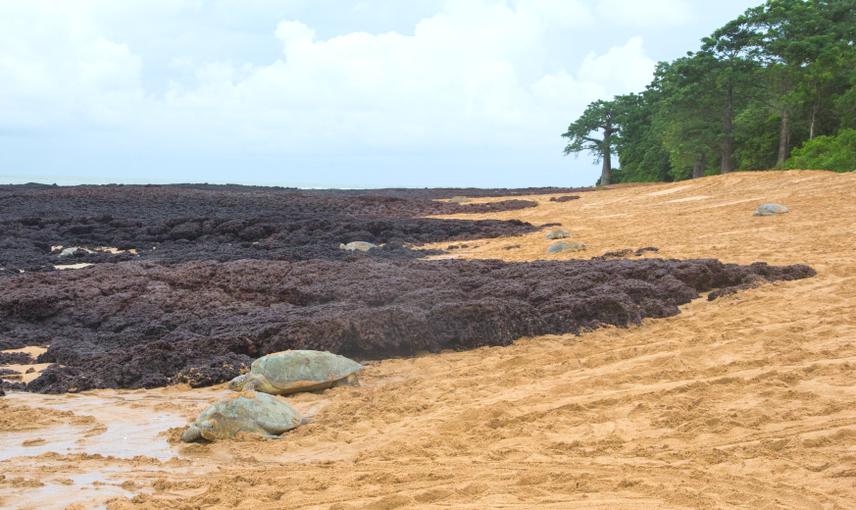Ana Rita Caldas Patricio
Other projects
27 Jun 2018
Impacts of Climate Change on West African Green Turtles and Marine Turtle Conservation in Guinea-Bissau
We aim to create a comprehensive assessment of climate change impacts on the largest green turtle population in West Africa, involving the local community in conservation work.

Green turtle tracks at Poilão. Over 80,000 tracks counted during 2014 season. Eight nesting females can be spotted in this photo.
The National Marine Park of João Vieira and Poilão, at the Bijagós archipelago, Guinea-Bissau, is a very remote area with restricted access. Research in the park is limited due to associated costs thus, although it hosts one of the largest populations of green turtles worldwide, there is limited information on population status and priority concerns. Consequently people are largely unaware of the extent of this important rookery, even sea turtle biologists.
Poilão Island alone hosts the most important green turtle rookery in Africa, third in the Atlantic. It is a sacred island among the Bijagós and our project counts with their participation, as we believe this to be essential for the long-term conservation of sea turtles in the archipelago.
Previous work conducted by our team at Poilão in 2013 suggested a high vulnerability of the nesting habitat to sea-level-rise (SLR), and we also identified an individual consistency in nest-site selection, which may play an important role in the adaptation to climate change and on future hatchling sex ratio.
Within our project we aim to:
1) increase the involvement of local staff and community members on conservation work;
2) estimate the impacts of SLR at Poilão and its nearby islands, as these may provide with suitable habitat and potential refuge if the main nesting habitat, at Poilão, becomes endangered;
3) understand the impacts of mean global warming on hatchling survival and sex ratio;
4) evaluate the outcomes of nest-site selection, in particular the role of individual behaviour on climate change impacts;
5) assess the mating patterns of the green turtle population at Poilão, through genetic techniques, to infer the current adult sex ratio, essential to understand the impact of hatchling sex ratio on the population.
Additionally, some significant long-lasting conservation outcomes intrinsic of this project are:
i) enhanced beach protection, as the presence of our team at nesting beaches effectively prevents poaching;
ii) reporting illegal fishing, as we have a privileged view of the surroundings of the National Park at Poilão;
iii) saving over 40 females (which can lay over a million eggs in their lifetime) and over 2000 hatchlings per nesting season, that get stranded at the intertidal rocks.
This is the first assessment of climate change impacts on green turtles from West Africa. New findings on these impacts should contribute and support the long-term global conservation of this species and their habitats.